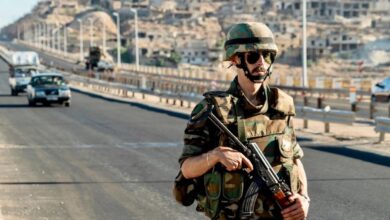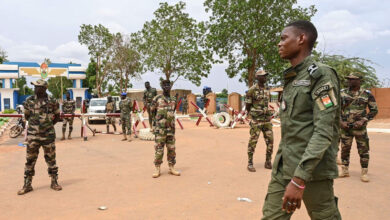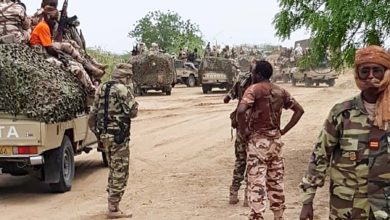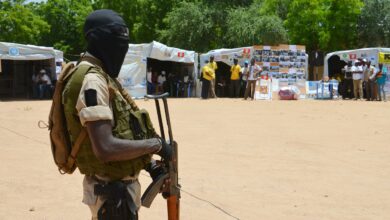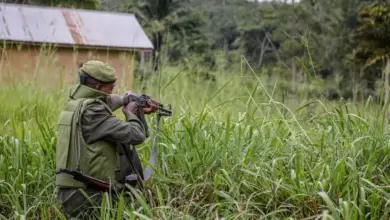Islamic State militants conducted multiple attacks on military bases in northeast Nigeria’s Borno state over the weekend, security sources told AFP on Monday, June 3.
Fighters believed to be from the Islamic State West Africa Province faction of Boko Haram attacked military bases on Saturday and Sunday, sources from the military and militia said. There were no immediate details on casualties.
Update June 4: Islamic State on Tuesday said its fighters were behind the attacks on Nigerian military posts in the Lake Chad area, claiming via its Amaq propaganda outlet that ISWAP fighters killed four soldiers and seized weapons and ammunition from the barracks in Marte, and burned the barracks in Diwka. In Kirenowa, ISIS claimed to have killed 10 soldiers and injured others.
Since July last year, ISWAP has intensified attacks on military targets, killing dozens of soldiers and overrunning bases mainly in Lake Chad region in Nigeria, Chad and Niger where it is the dominant insurgent group.
On Saturday, ISWAP fighters attacked a base in the town of Marte, around 90 km (56 miles) northeast of Borno state capital Maiduguri, pushing troops out after a prolonged gunfight, the two military sources said.
The militants ransacked and burned the base, carting away weapons abandoned by fleeing soldiers. The soldiers withdrew to Dikwa, around 38 km south, and Marte residents fled to Maiduguri, arriving in trucks on Sunday, according to residents of the city.
“The insurgents seem not to have intended harming any civilian, but only to capture the town; so they stormed the military base, taking troops there unawares at about 6 p.m.,” an unnamed source told Daily Trust.
“We engaged them in a fierce encounter for about an hour,” Daily Trust’s source said, adding that, “initially, we were about getting victorious over them, but they overpowered us, and all troops in the burning base were set asunder, with all of us fleeing in all directions in the bush.”
As they headed back towards Lake Chad, the militants sacked another base in Kirenowa, around 30 km east of Marte.
“The soldiers in Kirenowa have been evacuated to Dikwa after the attack by the terrorists,” a military officer who did not want to be identified told AFP. Troops returned to Kirenowa late on Sunday with reinforcement from Maiduguri, the sources said.
On Sunday, the insurgents attempted to seize a base in Dikwa in a predawn attack.
“The terrorists attacked troops in Dikwa around 4 a.m. but the attack was repelled without casualty on our side,” the officer said.
The fighters came in 13 trucks fitted with heavy machine guns, said a second officer, who gave a similar account.
Dikwa is home to more than 70,000 displaced people who live in several camps where they rely on food and humanitarian assistance from aid agencies.
Update June 3 A spokesperson for the MNJTF, the regional counter-insurgency force comprising personnel from Chad, Cameroon, Niger, and Nigeria, said that troops killed more than 20 insurgents in the Lake Chad area on Monday.
“In continuation of the ongoing offensive operations to oust Islamic State terrorists from the Lake Chad Area, troops of the Multinational Joint Task Force (MNJTF) in conjunction with national forces, in an early morning raid today, neutralized over 20 terrorists operating around Arege, Malkonory and Tumbum Rego general area,” Colonel Timothy Antigha said in a release that included graphic images of dead bodies.
Antigha said a Vehicle Borne Improvised Explosive Device was destroyed along with “several” technical vehicles.
“Unfortunately, 4 personnel of the MNJTF were wounded during the fire fight and have been evacuated for urgent medical attention,” Antigha added.
The MNJTF launched Operation Yancin Tafki on February 21 to battle the insurgents. It has said the cross-border operation is aimed at “making islands and other settlements in Lake Chad untenable for Boko Haram Terrorists.”
On April 1, the MNJTF said troops had killed 16 militants in the Kirenowa area, including Malloum Moussa, who was described as “a high ranking Boko Haram Commander.”
Islamic State has claimed fighters from its West Africa Province affiliate carried a number of attacks around Dikwa in recent months.
In late January, ISIS claimed 15 soldiers were killed in an attack on Nigerian military personnel in Dikwa in which military sources told AFP that eight soldiers were killed. Two days later, ISIS claimed three Nigerian soldiers were killed in an IED attack on Marte to Dikwa road.
On May 22, ISIS claimed ISWAP fighters in Dikwa killed 10 members of the “African Crusader Alliance,” a term it uses for the regional Multinational Joint Task Force.
Also over the weekend, Nigerian troops in a base in Dalwa village, 16 km outside Maiduguri, were dislodged after a six-hour battle with Boko Haram fighters which continued into Sunday, said the military sources and a local militia.
The jihadist group known as Boko Haram began its bloody insurgency in northeastern Nigeria in 2009, but it has since spread into neighboring Niger, Chad and Cameroon, prompting a regional military response.
Since 2009, more than 27,000 people have been killed and two million others displaced, sparking a dire humanitarian crisis in the region. On April 30, the U.S. Ambassador-at-Large and Coordinator for Counterterrorism Nathan A. Sales said that the U.S. assesses that Boko Haram and ISWAP “have been responsible for over 35,000 deaths since 2011.”
Boko Haram split into two factions in mid-2016. One, led by long-time leader Abubakar Shekau, is notorious for suicide bombings and indiscriminate killings of civilians. Shekau pledged allegiance to ISIS leader Abu Bakr Al-Baghdadi in March 2015, but ISIS central only gives formal backing to the other faction, which it calls Islamic State West Africa Province.
The ISWAP faction, which largely focuses on attacking military and government targets, was led by Abu Mus’ab Al-Barnawi, but in March, audio recordings revealed that ISIS appointed Abu Abdullah Idris bin Umar, also known as Ibn Umar al-Barnawi, as leader. ISIS has not yet made a public statement confirming the change.
On May 22, ISIS released a video showing ISWAP attacks and the execution of nine people, including one tank crewman who was killed with a rocket-propelled grenade.
With reporting from AFP



